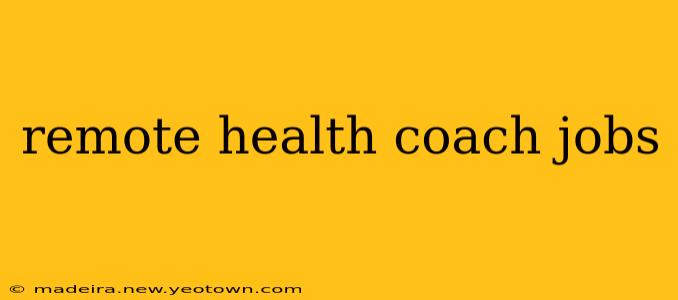The digital revolution has unlocked opportunities previously unimaginable, and the health and wellness industry is no exception. More and more health coaches are discovering the freedom and flexibility of remote work. But what does a remote health coach actually do, and how do you land one of these increasingly sought-after jobs? Let's dive in.
This isn't just about working from your pajamas (though that's a definite perk!). It's about leveraging technology to build meaningful relationships with clients, guiding them towards healthier lifestyles, all while setting your own hours and working from your ideal location.
What Does a Remote Health Coach Do?
Imagine a world where you help people achieve their health goals, all without ever stepping foot in a traditional office. That's the reality of being a remote health coach. Your days might involve:
- Personalized Coaching Sessions: Conducting one-on-one coaching sessions via video conferencing platforms like Zoom or Skype.
- Creating Customized Plans: Designing personalized nutrition and exercise plans tailored to each client's unique needs and goals.
- Tracking Progress and Providing Support: Monitoring client progress through various tools and offering continuous support and encouragement.
- Educational Content Creation: Developing blog posts, emails, or social media content to educate and engage your clients and potential clients.
- Marketing and Client Acquisition: Promoting your services through online channels, networking, and building your personal brand.
It's a dynamic role requiring a blend of empathy, knowledge, and tech-savviness.
What Qualifications Do I Need for a Remote Health Coach Job?
While specific requirements vary depending on the employer or if you're building your own practice, here are some common essentials:
- Relevant Certification: Many employers prefer candidates with certifications from reputable organizations like the American Council on Exercise (ACE) or the National Board for Health and Wellness Coaching (NBHWC).
- Experience: While not always mandatory, experience working with clients, either in a face-to-face or online setting, can significantly boost your job prospects.
- Strong Communication Skills: The ability to build rapport and effectively communicate with clients remotely is crucial.
- Technological Proficiency: You'll need to be comfortable using video conferencing, email, scheduling software, and potentially client management systems.
- Business Acumen (If Self-Employed): If you're planning to start your own remote health coaching business, you'll also need strong business skills, including marketing, finance, and client management.
How Do I Find Remote Health Coach Jobs?
The hunt for a remote health coach position can be exciting, but knowing where to look is half the battle.
- Job Boards: Websites like Indeed, LinkedIn, and FlexJobs regularly post remote health coach openings.
- Company Websites: Check the career pages of companies specializing in health and wellness or telehealth services.
- Networking: Connect with other health coaches and professionals in your field. Attend online events and webinars to expand your network.
- Freelance Platforms: Sites like Upwork and Fiverr can help you find freelance health coaching gigs.
What are the Benefits of Being a Remote Health Coach?
The advantages of this career path are numerous:
- Flexibility: Set your own hours and work from anywhere with a reliable internet connection.
- Location Independence: Work from home, a coffee shop, or even while traveling.
- Work-Life Balance: Better control over your schedule allows for a healthier work-life integration.
- Impactful Work: Make a real difference in people's lives by helping them achieve their health goals.
What are the Challenges of Being a Remote Health Coach?
While rewarding, remote health coaching also presents certain hurdles:
- Self-Discipline: Maintaining productivity and focus when working from home requires strong self-discipline.
- Technology Dependence: Reliable internet access and technological proficiency are essential.
- Isolation: Working remotely can sometimes lead to feelings of isolation, so building a strong support network is important.
- Marketing and Client Acquisition: Building a client base requires proactive marketing efforts.
Are there different specializations within Remote Health Coaching?
Yes! Just like in-person health coaching, there are many niches you can pursue, including:
- Weight Management Coaching: Helping clients achieve and maintain a healthy weight.
- Nutrition Coaching: Guiding clients towards healthier eating habits.
- Fitness Coaching: Providing personalized exercise plans and support.
- Stress Management Coaching: Helping clients develop coping mechanisms for stress.
- Chronic Disease Management Coaching: Supporting individuals managing chronic conditions like diabetes or heart disease.
How much can I earn as a Remote Health Coach?
Earning potential varies greatly depending on experience, certifications, client base, and pricing strategy. However, many remote health coaches earn a comfortable living, with income ranging from a supplemental income to a full-time salary.
Embarking on a journey as a remote health coach can be incredibly fulfilling. It requires dedication, hard work, and a genuine passion for helping others, but the rewards—both personal and professional—are immeasurable. So, take the leap, embrace the flexibility, and start building your dream career today!

